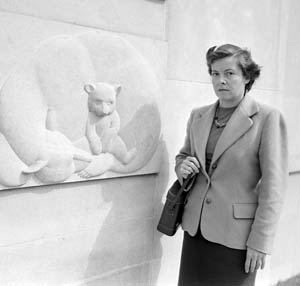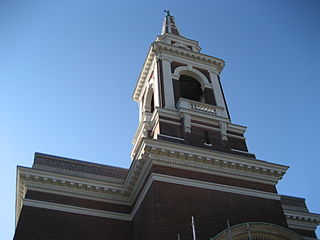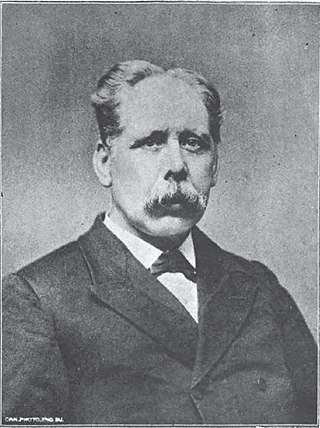Related Research Articles

Hamilton is a port city in the Canadian province of Ontario. Hamilton has a population of 569,353, and its census metropolitan area, which includes Burlington and Grimsby, has a population of 785,184. The city is approximately 45 kilometres (28 mi) southwest of Toronto in the Greater Toronto and Hamilton Area (GTHA).

The 1930 British Empire Games were the inaugural edition of what now is known as the Commonwealth Games, and were held in Hamilton, Ontario, from 16 to 23 August 1930.

Lincoln MacCauley Alexander was a Canadian lawyer who became the first Black Canadian member of Parliament in the House of Commons, the first Black federal Cabinet Minister, the first Black Chair of the Worker's Compensation Board of Ontario, and the 24th Lieutenant Governor of Ontario from 1985 to 1991. He was the first person to serve five terms as Chancellor of the University of Guelph, from 1991 to 2007. Alexander was also a governor of the Canadian Unity Council.

The Christian Heritage Party of Canada, also referred to as CHP Canada, is a minor social conservative and Christian right federal political party in Canada; it was founded in 1987, the brainchild of two couples in British Columbia, namely Bill and Heather Stilwell who were Roman Catholics and Ed Vanwoudenberg and his wife, Reformed Protestants. CHP advocates for Canada to be governed according to Christian principles and ethics. The party's stated principle is that "the purpose of civil government is to ensure security, freedom, and justice for all its citizens from conception till natural death, by upholding just laws". CHP states that, if the party forms government, it hopes to "apply proven Judeo-Christian principles of justice and compassion to Canada's contemporary public policy needs".

Lawrence Hill is a Canadian novelist, essayist, and memoirist. He is known for his 2007 novel The Book of Negroes, inspired by the Black Loyalists given freedom and resettled in Nova Scotia by the British after the American Revolutionary War, and his 2001 memoir Black Berry, Sweet Juice: On Being Black and White in Canada. The Book of Negroes was adapted for a TV mini-series produced in 2015. He was selected in 2013 for the Massey Lectures: he drew from his non-fiction book Blood: The Stuff of Life, published that year. His ten books include other non-fiction and fictional works, and some have been translated into other languages and published in numerous other countries.
Nerene Virgin is a Canadian journalist, actress, educator, author and television host, best known for her role on the children's television series Today's Special.

Jennifer F. Mossop is a former politician and journalist in Ontario, Canada. She was a Liberal member of the Legislative Assembly of Ontario from 2003 to 2007 who represented the Hamilton, Ontario riding of Stoney Creek.
Jackie Washington was a Canadian blues musician.

Graeme MacKay is the Hamilton Spectator's resident editorial cartoonist. Born in 1968, grew up in Dundas, Ontario. A graduate from Parkside High School in Dundas, Graeme attended the University of Ottawa majoring in History and Political Science. There he submitted cartoons to the student newspaper, The Fulcrum, and was elected as graphics editor by newspaper staff. Between 1989 and 1991 he illustrated and, along with writer Paul Nichols, co-wrote a weekly comic strip, entitled "Alas & Alack", a satire of current day public figures framed in a medieval setting.
Matthew Bullock was an American accused of inciting a riot, who fled to Canada and became a cause célèbre in the early 1920s.

Elizabeth Bradford Holbrook, CM, O.Ont was a Canadian portrait sculptor, medal designer and liturgical artist.

Central Presbyterian Church is a Presbyterian Church in Canada congregation in Hamilton, Ontario, Canada, located in the downtown area at the corner of Charlton and Caroline Street South.

Richard Alfred Newell, better known by his stage name, King Biscuit Boy, was a Canadian blues musician. He was the first Canadian blues artist to chart on the Billboard Hot 100 in the US Newell played guitar and sang, but he was most noted for his harmonica playing. Newell's stage name, given to him by Ronnie Hawkins, was taken from the King Biscuit Time, an early American blues broadcast.

William Boyd Stewart was a pastor, writer, and educator in the Baptist denomination of Canada.

Wilson A. Head was an American/Canadian sociologist and community planner known for his work in race relations, human rights and peace in the United States, Canada and other parts of the world.

The 2018 Hamilton municipal election was a municipal election that occurred on October 22, 2018, as per the Ontario Municipal Elections Act, 1996. Residents of Hamilton selected one mayor, members of the Hamilton City Council, and members of both the English and French Public and Catholic School Boards.
Evelyn Myrie is a community activist, particularly in the area of anti-Black racism, in Hamilton, Ontario. She is known for her community leadership, activism, anti-racism work. The Evelyn Myrie Award for Political Action was created in her honour. Myrie has received numerous awards and distinctions in recognition of her important contributions to equity work in Hamilton and in Canada, including the Queen Elizabeth II Golden Jubilee Award, Government of Canada, Queen Elizabeth II Diamond Jubilee Award, Government of Canada, the Woman of the Year Public Affairs Award from the City of Hamilton, and was the inaugural inductee into the City of Hamilton's Order of Hamilton award.
The Stewart Memorial Church is Hamilton, Ontario, Canada’s oldest Black congregation. It was established in the 1830s as St. Paul's African Methodist Episcopalian Church, and moved to its current site on John Street in 1879 after its original location on Rebecca Street was destroyed by a fire.
The Big Cigar is an upcoming biographical drama thriller miniseries developed by Jim Hecht and Joshuah Bearman.
References
- ↑ Nerene Virgin, John Christie Holland in the Canadian Encyclopedia, February 4, 2015
- 1 2 "Celebrating excellence at the Rev. John C. Holland Awards". Stony Creek News. Stony Creek, Ontario. Jan 11, 2008. Archived from the original on 7 November 2012. Retrieved 5 August 2011.
- ↑ Mahoney, Jeff (13 July 2012). "A family deserving of celebration". The Hamilton Spectator. Retrieved 13 July 2012.
- 1 2 3 4 5 6 7 Shadd, Adrienne (2010). The Journey from Tollgate to Parkway: African Canadians in Hamilton. Dundurn Press Ltd. pp. 222–236. ISBN 9781554883943.
- ↑ "The Story of what happened to slaves who followed the North Star on the Underground Railroad: The Holland family of Canada". Baltimore Afro-American. July 16, 1977. Retrieved 5 August 2011.
- 1 2 Newman, Mark (Feb 22, 2008). "Hamilton and Canada home to a variety of Afro-Canadian leaders". Dundas Star News. Retrieved 5 August 2011.[ dead link ]
- ↑ Elliott, James (Feb 1, 1996). "A friend to everyone: John Holland helped lead Hamilton's black community through some of its toughest times". The Spectator. Hamilton, Ontario. Retrieved 5 August 2011.
- ↑ Myrie, Evelyn (Nov 15, 2003). "Black leader deserves special place; Rev. John C. Holland". The Spectator. Hamilton, Ontario. Retrieved 5 August 2011.
- ↑ "African Canadian Online: Aspects of African-Canadian Culture". York University. Retrieved 13 July 2012.
- ↑ Myrie, Evelyn (Feb 10, 2011). "Holland fete a sesquicentennial legacy". The Spectator. Hamilton, Ontario. Retrieved 5 August 2011.
- ↑ Fraser, Hugh (January 13, 1999). "History group set to give out honours". The Spectator. Hamilton, Ontario. Retrieved 5 August 2011.